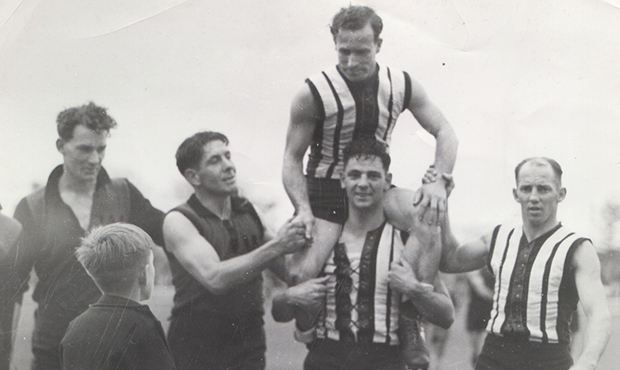Ford Fairlane
Moderator
- Feb 21, 2002
- 77,440
- 183,642
- AFL Club
- Port Adelaide
- Other Teams
- Port Adelaide Magpies
- Moderator
- #1
The club is going to do feature articles on Port Adelaide champions in the lead up to the Showdown. First up is Bob Quinn.
Bob Quinn

Bob Quinn
From a post of mine a few years back discussing the greats of SA football:
A guy I never saw play, but who has an enormous reputation at Port Adelaide is Bob Quinn. Small in stature (he was a rover) but enormous in spirit. Quinn sustained life threatening leg injuries when he virtually single handedly stormed a German stronghold in Tobruk in 1941. He won the Military Medal for that act of bravery. He came back and won the Magarey Medal four years later.
Some of his highlights include:
239 games, 386 goals for Port from 1933-42 and 1945-47.
Triple premiership player 1936,37,39.
Four time best and fairest 1937, 38, 45, 47.
Twice Port's leading goalkicker 1937, 45.
Magarey Medallist 1938, 45.
Represented SA 15 times, 26 goals.
Port captain coach 1939-40, 1945-47.
Tomorrow Gavin Wanganeen.
Bob Quinn
But if you asked and player or supporter of the club who was around during the 1930s and 1940s - the elder generations of the Port Adelaide faithful - who they rated as the club's best, they would unequivocally say Bob Quinn.
Of the two new northern gates at the Adelaide Oval, one is named for Quinn.
He played 239 games for Port Adelaide between 1933 and 1947 - including seasons with the combined Port/Torrens team during the Second World War.
A dogged forward who kicked 386 goals during his career, he was captain/coach of the Magpies in 1939, 1940 and between 1945 and 1947.
He was not opposed for the captaincy of the club in 1939, and the hierarchy did not hesitate in appointing him coach that year either.
...
But after just six games of the 1940 season, the club's leader enlisted with the Australian Army and was sent to North Africa to fight with the Allies against the Axis forces in Tobruk.
It was on that battlefield that he would earn the Military Medal for courage, leadership and devotion in battle during August 1941.

Bob Quinn
From a post of mine a few years back discussing the greats of SA football:
A guy I never saw play, but who has an enormous reputation at Port Adelaide is Bob Quinn. Small in stature (he was a rover) but enormous in spirit. Quinn sustained life threatening leg injuries when he virtually single handedly stormed a German stronghold in Tobruk in 1941. He won the Military Medal for that act of bravery. He came back and won the Magarey Medal four years later.
Some of his highlights include:
239 games, 386 goals for Port from 1933-42 and 1945-47.
Triple premiership player 1936,37,39.
Four time best and fairest 1937, 38, 45, 47.
Twice Port's leading goalkicker 1937, 45.
Magarey Medallist 1938, 45.
Represented SA 15 times, 26 goals.
Port captain coach 1939-40, 1945-47.
Tomorrow Gavin Wanganeen.


